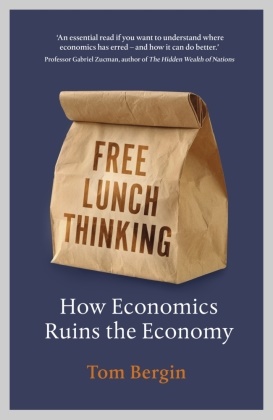Read more
Economic theories and models shape our everyday lives. They are relied on by politicians when tax rises or cuts are being considered. They inform debates about everything from bonuses for CEOs to minimum wage rates to the level of job protection enshrined in law. They determine what levels of tobacco or petrol duty are charged, and influence government approaches to issues as diverse as obesity and climate change.
The question is: are policy makers right to be so slavishly reliant on them? Tom Bergin is sceptical, and in Free Lunch Thinking he subjects eight of the most prevalent economic mantras to close scrutiny, assessing how they play out in practice. Again and again, he shows how individuals, companies and markets fail to respond to policy changes as theory predicts. He exposes the missed opportunities and wasted resources that result. And by tracing the development of key economic tenets, he demonstrates how their champions' tendency to believe in phenomena for which they have little hard evidence leaves accepted economic wisdom frequently being more about faith than facts.
His book both exposes and challenges lazy thinking. It also sets out a path for more considered future.
About the author
Tom Bergin is an investigative financial journalist for Reuters. His work has prompted parliamentary inquiries and won numerous awards in Britain, the United States and Asia, including a Gerald Loeb Award for Distinguished Business Journalism and the Orwell Prize for Journalism. In 2013, he was named Business Journalist of the Year at the British Press Awards. His previous book,
Spills & Spin: The Inside Story of BP, was named a
Sunday Times Politics Book of the Year in 2011.
Before entering journalism 20 years ago, Tom worked in asset management and as an energy broker. He grew up in Ireland and lives in London.
Summary
Economic theories and models shape our everyday lives. They are relied on by politicians when tax rises or cuts are being considered. They inform debates about everything from bonuses for CEOs to minimum wage rates to the level of job protection enshrined in law. They determine what levels of tobacco or petrol duty are charged, and influence government approaches to issues as diverse as obesity and climate change.
The question is: are policy makers right to be so slavishly reliant on them? Tom Bergin is sceptical, and in Free Lunch Thinking he subjects eight of the most prevalent economic mantras to close scrutiny, assessing how they play out in practice. Again and again, he shows how individuals, companies and markets fail to respond to policy changes as theory predicts. He exposes the missed opportunities and wasted resources that result. And by tracing the development of key economic tenets, he demonstrates how their champions' tendency to believe in phenomena for which they have little hard evidence leaves accepted economic wisdom frequently being more about faith than facts.
His book both exposes and challenges lazy thinking. It also sets out a path for more considered future.
Report
An essential read if you want to know how economics has erred - and how it can do better. Gabriel Zucman, author of 'The Hidden Wealth of Nations'

